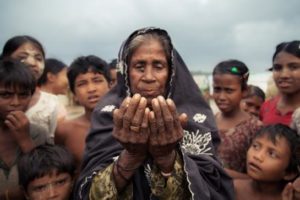Published in The Daily Star on Monday, 6 December 2016
MYANMAR’S ETHNIC CLEANSING
A deterrent to regional development
 Following the end of almost fifty years of military rule in Myanmar and the release of the Nobel Laureate leader Aung San Suu Kyi in 2011, the world had looked at the country with much enthusiasm. The quasi-civilian new government brought some hope for the country to return to democracy as well as economic progress. Even with rich natural resources including land, forests, minerals, oil and gas, the country remained poor and could achieve a per capita income of only USD 1,197 in 2011. So once freed from the military regime, with a view to modernise its economy, Myanmar embraced economic openness and initiated reforms in areas such as currency exchange rates, taxation, foreign investment laws and anti-corruption. Several countries, including those which isolated the nation through economic sanctions such as the US and the European Union, saw opportunities to rebuild economic ties with Myanmar. Political leaders from the US, Europe, Japan, Australia, China, India, Thailand, Bangladesh and many other countries flew in, investors rushed and businessmen flocked into the country to explore its untapped resources. International endorsements revived the country’s confidence and growth prospects. Its GDP grew by more than 7 percent in the last couple of years.
Following the end of almost fifty years of military rule in Myanmar and the release of the Nobel Laureate leader Aung San Suu Kyi in 2011, the world had looked at the country with much enthusiasm. The quasi-civilian new government brought some hope for the country to return to democracy as well as economic progress. Even with rich natural resources including land, forests, minerals, oil and gas, the country remained poor and could achieve a per capita income of only USD 1,197 in 2011. So once freed from the military regime, with a view to modernise its economy, Myanmar embraced economic openness and initiated reforms in areas such as currency exchange rates, taxation, foreign investment laws and anti-corruption. Several countries, including those which isolated the nation through economic sanctions such as the US and the European Union, saw opportunities to rebuild economic ties with Myanmar. Political leaders from the US, Europe, Japan, Australia, China, India, Thailand, Bangladesh and many other countries flew in, investors rushed and businessmen flocked into the country to explore its untapped resources. International endorsements revived the country’s confidence and growth prospects. Its GDP grew by more than 7 percent in the last couple of years.
The victory of Aung San Suu Kyi’s National League for Democracy in the election of November 2015 was considered to be another step towards re-establishment of the democratic process in the country. Unfortunately, this has not changed the political ideology of the country when it comes to dealing with the Rohingya minority. Suu Kyi’s upper hand in Myanmar’s politics has not changed the old image of a nation violent against the Rohingya population. In recent times, the unspeakable atrocities against the Rohingya population in the Rakhine state by the security forces of Myanmar have reinforced this image. Shockingly, while the world watches with horror as Myanmar’s army shoot innocent people, burn their houses and abuse women and children, Suu Kyi, the icon of democracy and human rights remains a quiet spectator of this brutality.
The Muslim Rohingya population has long been marginalsied. They are the poorest community of Myanmar, with little or no health, education and other basic facilities. They are a stateless ethnic minority, as they are not even recognised officially. They are denied citizenship, even though they were born and have been living in Myanmar for generations. Tellingly, some Buddhist monks, who are generally perceived to be non-violent and do not support killing, also take part in this abuse of the Rohingyas. Had such a crime been committed by a majority Muslim community, they would have been immediately branded ‘terrorists’ or human rights abusers, and taken to task by the international community. The cruelty of Buddhist monks only reiterates that extremism has nothing to do with religion. It can take root in anyone with an extreme sense of nationalism and intolerance.
 Bangladesh has a 193-kilometres long border with Myanmar. Being its next door neighbour, Bangladesh bears the brunt of Myanmar’s brutality against Rohingyas. Thousands of Rohingyas have already entered Bangladesh. Several thousand others are waiting to cross to this side. From a humanitarian point of view, we cannot close our border. But Bangladesh itself is a poor and populous country with limited capacity. It requires both financial and managerial capacity to deal with the pressure of such large inflows of Rohingya refugees. Repatriation of these refugees will require political and economic efforts. There are security issues as well.
Bangladesh has a 193-kilometres long border with Myanmar. Being its next door neighbour, Bangladesh bears the brunt of Myanmar’s brutality against Rohingyas. Thousands of Rohingyas have already entered Bangladesh. Several thousand others are waiting to cross to this side. From a humanitarian point of view, we cannot close our border. But Bangladesh itself is a poor and populous country with limited capacity. It requires both financial and managerial capacity to deal with the pressure of such large inflows of Rohingya refugees. Repatriation of these refugees will require political and economic efforts. There are security issues as well.
From 1978-79 and 1992-94, Bangladesh had to deal with a similar situation. And the flow of Rohingyas into Bangladesh and their illegal residence here has continued. Desperation has led them to disguise their identity. Several Burmese are working in Saudi Arabia as Bangladeshi labourers, and thus Bangladesh runs the risk of being liable for any unwanted acts of those migrants.
Myanmar should not take Bangladesh’s magnanimity for granted, and continue to push Rohingyas here. If Myanmar wants to prosper and be part of regional and sub-regional initiatives, it has to change its perspective and make place for all its ethnic groups and treat them equally.
Bangladesh is also connected with Myanmar through various sub-regional cooperation initiatives. These include the Bay of Bengal Initiative for Multi-Sectoral Technical and Economic Cooperation (BIMSTEC) launched in 1997, and the Bangladesh, China, India, and Myanmar (BCIM) Economic Corridor initiative launched in 1999. Both these initiatives have high potential for economic advancement in the region through greater market access for goods and services, investment in infrastructure development, energy cooperation and higher connectivity. The BIMSTEC region has a GDP of about USD 2.7 trillion and a population size of around 3.1 billion. The BCIM sub-region, with a population of about 2.8 billion, has potential for intra-regional trade equivalent to USD 125 billion.
Till now, none of these initiatives have taken off in a meaningful way due to lack of political commitment. With political relationships getting worse due to violence against Rohingyas, there is little hope of an improved situation. After all, regional economic cooperation cannot take place in a void. Peace and security are preconditions for regional success. Two giant Asian economies, India and China, have active interest in both Bangladesh and Myanmar. It is time for them to play their role to uphold the spirit of humanity. For decades, Myanmar has either ignored or refused to sign various international treaties that protect human rights, such as the United Nations Convention against Torture, and thus, it has found a convenient excuse to get away with such humanitarian crimes. It is also therefore time for the international community to take actions to stop such barbarism against innocent Rohingyas.
The writer is Research Director at the Centre for Policy Dialogue.


